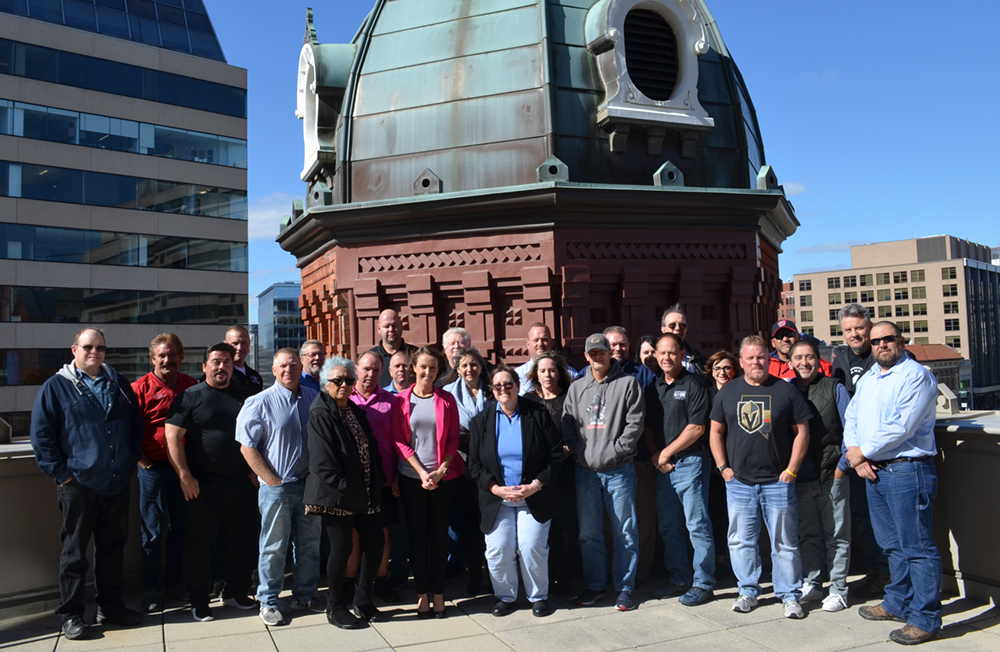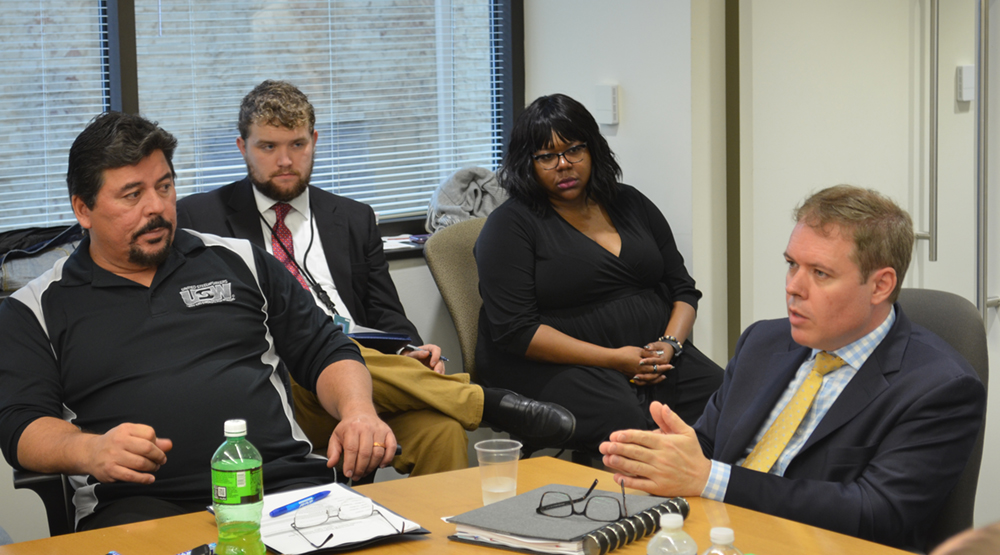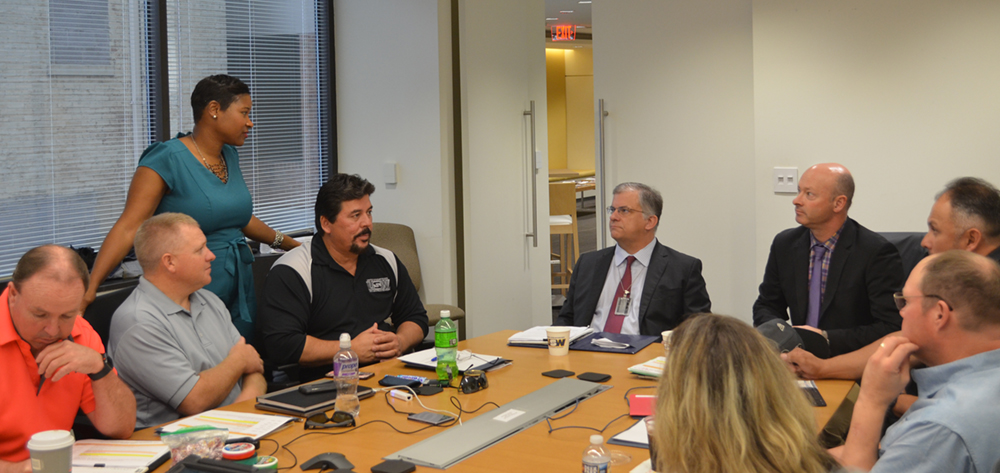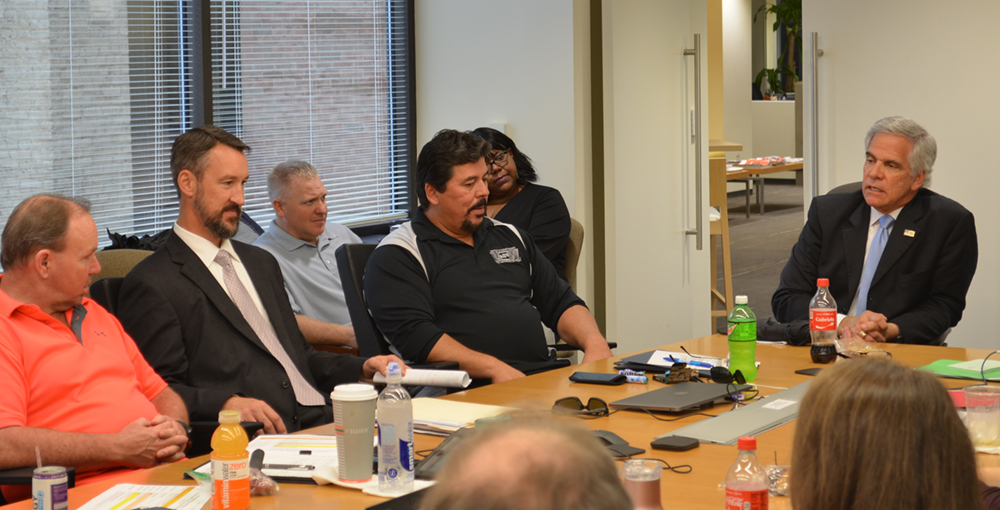A parade of current and former Department of Energy (DOE) officials addressed USW’s Atomic Energy Workers Council (AEWC), and answered and listened to members’ questions, concerns and suggestions on the first day of the group’s biannual meeting in Washington, D.C.
The two-day meeting, held Oct. 31 and Nov. 1, at USW’s Legislative and Policy office, attracted nearly 30 council members representing U.S. Department of Energy (DOE) sites and two nuclear facilities.

The USW Atomic Energy Workers Council met Oct. 31—Nov. 1 at the USW Legislative and Policy Office in Washington, DC, for the group’s biannual meeting. Photo credit: Mike Hancock, USW Local 9-562 retiree
“This is the first time we have had multiple representatives from DOE over the last three years, so this is progress,” said USW International Vice President Roxanne Brown.
She began the meeting addressing recent leadership changes within the USW and DOE, and described her role as slightly different from retired Vice President Carol Landry’s because she oversees the nuclear sector in addition to heading the union’s legislative, policy and political work.
Brown’s years of experience navigating DOE, lobbying for cleanup funding and meeting with contractors like Fluor, taught her that the atomic sector has support from all sides of the political spectrum.
She encouraged council members to educate DOE officials by telling them what is happening at their sites and offer suggestions for improvement. “This gives you a voice you may not have at your site,” Brown said.
Suggestions for DOE
William (Ike) White, senior advisor for environmental management to the undersecretary for science, fielded questions and suggestions regarding DOE’s environmental management (EM) program. This past September marked 30 years of nuclear waste cleanup. He said that although 90 percent of the cleanup is done for contaminated land at DOE sites, “we’re still not half done. The amount of time, work and resources needed will take more than 30 years.”

William (Ike) White, Senior Advisor for Environmental Management to the Under Secretary for Science, Department of Energy, (center) emphasizes a point to the USW Atomic Energy Workers Council. Local Union 12-652 President Matt Chavez sits at the table listening. Photo credit: Mike Hancock, USW Local 9-562 retiree
He said the DOE is transitioning from easy cleanup work to harder projects, especially at the Hanford Nuclear Reservation.
Pete Gomez, a Local 12-369 member at Hanford, asked White about the three outstanding contracts DOE extended with its existing contractors and when the agency would select contractors for the new agreements.
White said DOE is in its final analysis for selecting the contractors. He also discussed how DOE historically handled its agreements with contractors. Now, the agency wants indefinite delivery/indefinite quantity (IDIQ) contracts for fixed periods of time with contractors that have high-quality management teams, he said.
AEWC President Jim Key suggested to White that when DOE achieves a cleanup milestone, EM should acknowledge the contributions of the work force in the accomplishment.
John Knauff, president of Local 1-689 at the former Portsmouth Gaseous Diffusion Plant, suggested that White work closely with local unions to ensure contractors are doing their jobs properly. He said contractors at the Portsmouth site are performing open-air demolition of buildings containing contaminated, radioactive equipment without decontaminating them first.
Knauff and Key told White about contractors denying employees’ requests to wear respirators and employees getting injured as a result.
Bill Collins, a Local 12-369 member at Hanford, said the contractor taking down the Plutonium Finishing Plant (PFP) hired people off the street instead of workers with decades of experience. He said the contractor would not listen to experienced workers on how to take the plant down.
After hearing council members’ suggestions and stories, White said he would “commit personally” to meeting with union workers at the DOE sites.
Local 12-652 President Matt Chavez also urged White to have the DOE retain Fluor, the cleanup contractor at Idaho National Laboratory. “Changing Fluor would be a big mistake,” Chavez said. “The communication is perfect and Fluor gets with the local on issues.”
White said he understood, and pointed out that performance is a factor when DOE selects contractors.
Brown requested that White restart quarterly meetings between Fluor, DOE and the USW because it “cut through the issues, particularly at Portsmouth.”
“Your management team will tell you what you want to hear,” Key said. “I will tell you the truth.”
Building connections
Appearances by other DOE officials proved fruitful for the AEWC.
Mark Planning, director of intergovernmental and external affairs for DOE, said he wanted to build a partnership with the council. “I’m a resource for you,” he said. “We’re anxious to work with you.”

USW International Vice President Roxanne Brown (standing) describes the council’s work to Mark Planning (left at head of table) and Dr. John Carmack (right at head of table). Planning is Director of Intergovernmental and External Affairs for the Department of Energy. Carmack is the Senior Technical Advisor to the Assistant Secretary of Nuclear Energy. Photo credit: Mike Hancock, USW Local 9-562 retiree
John Carmack, assistant secretary of nuclear energy, said the DOE wants smaller modular reactors (SMR’s) to be factory-built in the United States. Brown said the USW supports nuclear power, and would like to see USW members play a role in making the components necessary for SMR’s and advanced nuclear technology, pointing out the infrastructure already available at the former Paducah and Portsmouth Gaseous Diffusion Plant sites.
Prioritizing safety
Kevin Dressman, director of DOE’s office of enforcement, spoke about the agency’s efforts to improve the safety culture at the cleanup sites. DOE is a self-regulating agency, so OSHA does not inspect the sites. He said DOE provides incentives in its agreements with the contractors so they discover problems before they turn into health and safety incidents.
While the Office of Enforcement does not inspect sites, it will post notice of investigation letters and outcomes on its website. While the office’s focus is on major health and safety issues, it also pays attention to lower-level issues that show a trend.
Dressman said his office emphasizes higher controls for health and safety than personal protective equipment (PPE). Elimination of hazards is evaluated first, then engineering and administrative controls, with PPE used last. Not blaming the workers for health and safety incidents is also integral to a good safety culture, as well as robust sharing of lessons learned, he said.
Former DOE official Glenn Podonsky, who ran the department’s Environment, Health, Safety and Security organization, came to the AEWC meeting at the request of Matt Chavez, Henry Littleford and Ryan Christensen from Local 12-652 at Idaho National Laboratory. In his prior role, Podonsky always visited AEWC meetings and helped resolve health and safety issues raised by AEWC members.

(At the head of the table) Glenn Podonsky, an old friend of the USW Atomic Energy Workers Council, talks about what makes a good manager. Sitting at the table are left to right: Henry Littleford (LU 12-652), Kevin Dressman (Director, Office of Enforcement, Department of Energy) and LU 12-652 President Matt Chavez. LU 12-652 member Ryan Christensen sits by the window. Podonsky spoke to the council at the request of Littleford, Chavez and Christensen. Photo credit: Mike Hancock, USW Local 9-562 retiree
Now a Department of Homeland Security manager with 47 years of government experience, Podonsky encouraged the council to persist in resolving issues with the DOE and the contractors. “Persistence prevails,” Podonsky said. “What you’re doing is too important to give up.”
